
Bulgaria, officially the Republic of Bulgaria, is a country in Southeast Europe. Located west of the Black Sea and south of the Danube river, Bulgaria is bordered by Greece and Turkey to the south, Serbia and North Macedonia to the west, and Romania to the north. It covers a territory of 110,994 square kilometres (42,855 sq mi) and is the 16th largest country in Europe. Sofia is the nation's capital and largest city; other major cities include Burgas, Plovdiv, and Varna.
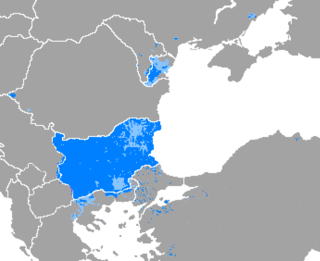
Bulgarian is an Eastern South Slavic language spoken in Southeast Europe, primarily in Bulgaria. It is the language of the Bulgarians.

The Balkan Wars were a series of two conflicts that took place in the Balkan states in 1912 and 1913. In the First Balkan War, the four Balkan states of Greece, Serbia, Montenegro and Bulgaria declared war upon the Ottoman Empire and defeated it, in the process stripping the Ottomans of their European provinces, leaving only Eastern Thrace under Ottoman control. In the Second Balkan War, Bulgaria fought against the other four original combatants of the first war. It also faced an attack from Romania from the north. The Ottoman Empire lost the bulk of its territory in Europe. Although not involved as a combatant, Austria-Hungary became relatively weaker as a much enlarged Serbia pushed for union of the South Slavic peoples. The war set the stage for the July crisis of 1914 and thus served as a prelude to the First World War.

The Balkans, corresponding partially with the Balkan Peninsula, is a geographical area in southeastern Europe with various geographical and historical definitions. The region takes its name from the Balkan Mountains that stretch throughout the whole of Bulgaria. The Balkan Peninsula is bordered by the Adriatic Sea in the northwest, the Ionian Sea in the southwest, the Aegean Sea in the south, the Turkish straits in the east, and the Black Sea in the northeast. The northern border of the peninsula is variously defined. The highest point of the Balkans is Musala, 2,925 metres (9,596 ft), in the Rila mountain range, Bulgaria.
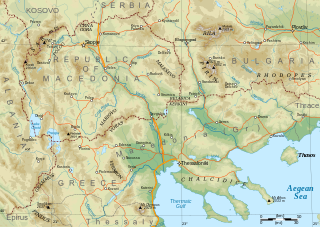
Macedonia is a geographical and historical region of the Balkan Peninsula in Southeast Europe. Its boundaries have changed considerably over time; however, it came to be defined as the modern geographical region by the mid-19th century. Today the region is considered to include parts of six Balkan countries: all of North Macedonia, large parts of Greece and Bulgaria, and smaller parts of Albania, Serbia, and Kosovo. It covers approximately 67,000 square kilometres (25,869 sq mi) and has a population of around five million. Greek Macedonia comprises about half of Macedonia's area and population.

Sofia is the capital and largest city of Bulgaria. It is situated in the Sofia Valley at the foot of the Vitosha mountain, in the western part of the country. The city is built west of the Iskar river and has many mineral springs, such as the Sofia Central Mineral Baths. It has a humid continental climate. Being in the centre of the Balkans, it is midway between the Black Sea and the Adriatic Sea and closest to the Aegean Sea.

Bulgarians are a nation and South Slavic ethnic group native to Bulgaria and its neighbouring region, who share a common Bulgarian ancestry, culture, history and language. They form the majority of the population in Bulgaria, while in North Macedonia, Ukraine, Moldova, Serbia, Albania, Romania, Hungary and Greece they exist as historical communities.

The Second Balkan War was a conflict that broke out when Bulgaria, dissatisfied with its share of the spoils of the First Balkan War, attacked its former allies, Serbia and Greece, on 16 (O.S.) / 29 (N.S.) June 1913. Serbian and Greek armies repulsed the Bulgarian offensive and counterattacked, entering Bulgaria. With Bulgaria also having previously engaged in territorial disputes with Romania and the bulk of Bulgarian forces engaged in the south, the prospect of an easy victory incited Romanian intervention against Bulgaria. The Ottoman Empire also took advantage of the situation to regain some lost territories from the previous war. When Romanian troops approached the capital Sofia, Bulgaria asked for an armistice, resulting in the Treaty of Bucharest, in which Bulgaria had to cede portions of its First Balkan War gains to Serbia, Greece and Romania. In the Treaty of Constantinople, it lost Adrianople to the Ottomans.

The Bulgaria national football team represents Bulgaria in men's international football, and is administered by the Bulgarian Football Union, a member association of UEFA.
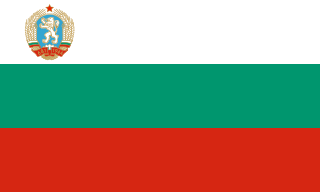
The People's Republic of Bulgaria was the official name of Bulgaria when it was a socialist republic from 1946 to 1990, ruled by the Bulgarian Communist Party (BCP) together with its coalition partner, the Bulgarian Agrarian People's Union. Bulgaria was closely allied and one of the most loyal satellite states of the Soviet Union during the Cold War, sometimes being called the 16th Soviet Republic rather than an independent country. Bulgaria was also part of Comecon as well as a member of the Warsaw Pact. The Bulgarian resistance movement during World War II deposed the Tsardom of Bulgaria administration in the Bulgarian coup d'état of 1944 which ended the country's alliance with the Axis powers and led to the People's Republic in 1946.
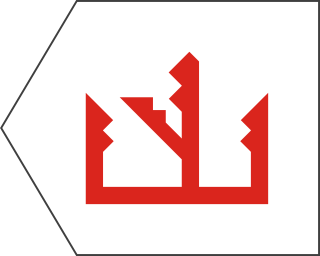
The Second Bulgarian Empire was a medieval Bulgarian state that existed between 1185 and 1396. A successor to the First Bulgarian Empire, it reached the peak of its power under Tsars Kaloyan and Ivan Asen II before gradually being conquered by the Ottomans in the early 15th century.

The First Bulgarian Empire was a medieval state that existed in Southeastern Europe between the 7th and 11th centuries AD. It was founded in 680–681 after part of the Bulgars, led by Asparuh, moved south to the northeastern Balkans. There they secured Byzantine recognition of their right to settle south of the Danube by defeating – possibly with the help of local South Slavic tribes – the Byzantine army led by Constantine IV. During the 9th and 10th century, Bulgaria at the height of its power spread from the Danube Bend to the Black Sea and from the Dnieper River to the Adriatic Sea and became an important power in the region competing with the Byzantine Empire.

The Tsardom of Bulgaria, also known as the Third Bulgarian Tsardom, sometimes translated as the Kingdom of Bulgaria, or simply Bulgaria, was a constitutional monarchy in Southeastern Europe, which was established on 5 October 1908, when the Bulgarian state was raised from a principality to a tsardom.

Major William Frank Thompson was a British officer who acted as a liaison between the British Army and the Bulgarian communist partisans during the Second World War.

North Macedonia, officially the Republic of North Macedonia, is a landlocked country in Southeast Europe. It shares land borders with Greece to the south, Albania to the west, Bulgaria to the east, Kosovo to the northwest and Serbia to the north. It constitutes approximately the northern third of the larger geographical region of Macedonia. Skopje, the capital and largest city, is home to a quarter of the country's population of 1.83 million. The majority of the residents are ethnic Macedonians, a South Slavic people. Albanians form a significant minority at around 25%, followed by Turks, Roma, Serbs, Bosniaks, Aromanians and a few other minorities.
Mamia III Dadiani was a member of the House of Dadiani and eristavi ("duke") of Odishi, that is, Mingrelia, in western Georgia from 1512 until his death. Mamia was a son and successor of Liparit II Dadiani, who had emerged as a semi-independent ruler in the process of dissolution of the Kingdom of Georgia. Mamia was culturally active in Abkhazia and continued his predecessors' efforts to secure borders against the North Caucasian mountainous tribes of Zygia. His naval expedition against them and landing in Zygia ended in a fiasco and Mamia was killed in battle.
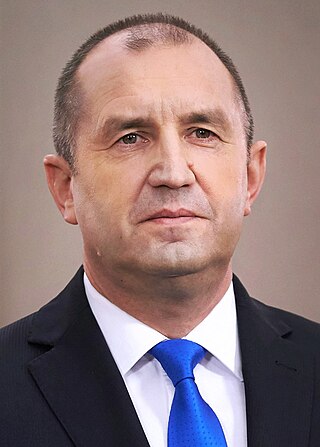
Rumen Georgiev Radev is a Bulgarian politician and former major general who has been the president of Bulgaria since 22 January 2017.
Giorgi II Gurieli, of the House of Gurieli, was Prince of Guria from 1564 to 1583 and again from 1587 to 1600. Succeeding on the death of his father Rostom Gurieli, Giorgi's rule over his small principality, located in southwest Georgia, was a period of conflict with the neighboring Dadiani of Mingrelia and increasing assertiveness of the Ottomans whom Gurieli submitted in 1581. His reign was interrupted, from 1583 to 1587, by a Mingrelian invasion, but Giorgi was able to resume the throne with Ottoman support.
Uttara West Thana is a thana of Bangladesh situated in Sector 11 of Uttara, Dhaka.

The Trun Partisan Detachment was a subdivision of the First Sofia Insurgent Operational Zone of the so-called People's Liberation Insurgent Army (NOVA) during the partisan movement in Bulgaria. It mainly operated in the area of Trun and Breznik.

















